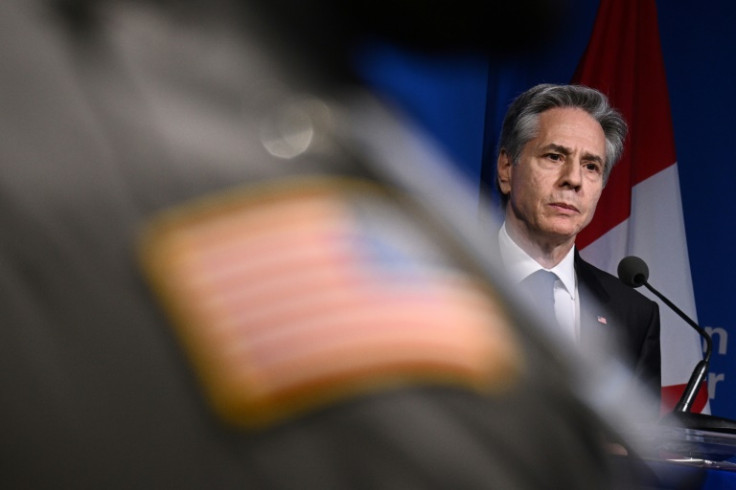Blinken Heads To Europe As Doubts Grow On US Leadership

Secretary of State Antony Blinken heads to Europe on Wednesday as he faces an uphill climb to quell doubts on US leadership, with Congress deadlocked on providing new aid to Ukraine and presidential contender Donald Trump lashing out at NATO allies.
Months before President Joe Biden stands for reelection, Blinken will take part in the Munich Security Conference alongside Vice President Kamala Harris after first stopping Thursday in Albania, a close US ally that has strongly backed Ukraine as it defends against Russia's invasion.
The trip comes as Ukraine is beginning to feel the pinch from a lack of new US weapons and ammunition. Trump -- Biden's predecessor and likely Republican challenger to him in November -- is pressuring his party not to seal a package in Congress to resume military and economic assistance to Kyiv.
The Senate on Tuesday approved a $95 billion package for Ukraine, Israel and Taiwan by a comfortable margin, but House Speaker Mike Johnson, a Trump ally, has refused to put it to a vote in the lower chamber.
Trump during his four-year tenure voiced admiration for Russian President Vladimir Putin and questioned the US treaty commitment to defend NATO allies, saying it was unfair for the United States to pay so much.
At a campaign rally on Saturday, Trump said he would even "encourage" the Russians "to do whatever the hell they want" if a NATO member does not "pay your bills," a reference to defense spending.
Biden denounced Trump's remarks in a televised appearance from the White House on Tuesday, saying: "It's dumb. It's shameful. It's dangerous. It's un-American."
Trump has suggested that Russia will triumph and has sought to tie Ukraine aid to pressure on Biden to crack down on migrants seeking to enter the United States, a signature issue for the Republican candidate.
Jake Sullivan, Biden's national security advisor, said the United States was increasingly hearing of Ukrainian troops "rationing, or even running out, of ammunition on the frontlines as Russian forces continue to attack."
"The stakes are getting higher," Sullivan told reporters Wednesday. "Our allies are watching this closely. Our adversaries are watching this closely.
The Munich Security Conference each year brings together the world's elite defense policymakers and is seen as a barometer on transatlantic relations.
"It's very clear to me wherever I go, and when I speak to people, that people watching the US appear very nervous," said Comfort Ero, head of the International Crisis Group.
"I think the US is still seen as an influential player -- both positively and negatively -- internationally. But I think increasingly there's alarm, there's concern, there is uneasiness, about the uncertainty, the unpredictability, just the polarization, the division," she said.
James O'Brien, the top US diplomat for Europe, said that allies "understand that we have domestic politics just as they do" and that aid for Ukraine enjoyed "overwhelming support" among lawmakers.
Sullivan voiced confidence the assistance would pass if it comes to a House vote.
In an opinion piece published Wednesday in The Hill, which covers Congress, British Foreign Secretary David Cameron pointed to the World War II alliance as he urged approval of aid to Ukraine.
"I believe our joint history shows the folly of giving in to tyrants in Europe who believe in redrawing boundaries by force," he wrote.
"We have the resources, the economic might, the expertise," he wrote. "All we need to do is make our strength pay. The question is: Do we have the will?"
Before Munich, Blinken will visit Tirana and meet Prime Minister Edi Rama. Albania turned firmly toward the West after decades of isolation under communist strongman Enver Hoxha, joining NATO in 2009.
Rama won US praise for chairing a contentious UN Security Council session last year on Ukraine attended by Blinken, Russian Foreign Minister Sergei Lavrov and Ukrainian President Volodymyr Zelensky.
Albania has also been a major hub to welcome Afghans who fled their country after the Taliban took back power in 2021.
© Copyright AFP 2024. All rights reserved.





















